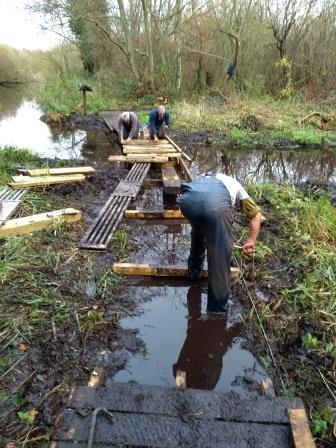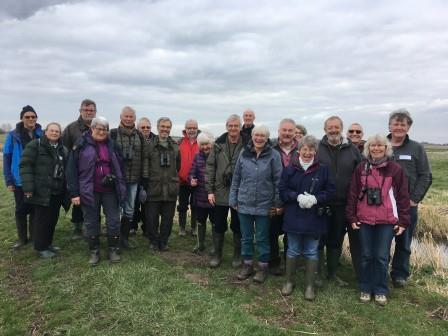The role of the Volunteer Coordinator/Manager in the conservation sector
This post is greater than 6 months old - links may be broken or out of date. Proceed with caution!

By Alan Marchbank, Volunteer Coordinator
I became Norfolk Wildlife Trust (NWT)’s Volunteer Coordinator in April 2017. When I applied for the role I was living in Brighton and I was managing a small Health and Wellbeing volunteering project for people aged 50 and over called Lifelines, which was run by the national volunteering charity Volunteering Matters. The premise of that project was to get over-50s volunteering with other over-50s, either by running activities in a sheltered housing scheme, or by supporting them to medical appointments.

As such, my job had nothing to do with conservation. My transferable skills came from the experience I had built up over 12 year working in the voluntary sector for a range of organisations, including Age Concern (now Age UK) Brighton and Hove and Brighton Housing Trust, a charity supporting homeless people.
My educational background was in life sciences, and I qualified with a BSc in Combined Sciences (Biology and Chemistry) from the University of Brighton. I spent the first 13 years of my working life in the pharmaceutical industry, and after a year volunteering in Cambodia in 2004/5 I decided on a change in career. My route into working for the organisations in Brighton mentioned above was through volunteering, so I understood the role of volunteers from both sides. It also gave me an appreciation of what was required to gain employment in a field for which you had not formally trained.
My main responsibilities as Volunteer Coordinator with NWT are to recruit new volunteers, and to support existing volunteers. I manage a small number of volunteers directly, but most of the 450 or so NWT volunteers are line managed by the NWT staff members they volunteer with. We have volunteers supporting us across the organisation, from our Visitor Centres to our Reserves, at our head office in Norwich and out at events across the County. We are very fortunate to have a loyal and hugely motivated band of volunteers who love nature and wildlife and want to ‘do their bit’ to conserve them.
Day to day my tasks include replying to volunteer enquiries, communicating with colleagues to see if they have any vacancies for potential volunteers, and ensuring colleagues arrange induction training with any volunteers they are able to place. I will also go and meet potential volunteers for the two projects I manage myself, our Independent Events Team and our Wild Walk Leaders. I will explain the roles in detail, what is expected of our volunteers and what they can expect from us. If applicants are happy to proceed with their applications after the initial meeting I will conduct or arrange an induction session. These sessions mainly cover Health and Safety issues volunteers need to be aware of, the work of NWT and how their role relates to our objectives, and any further training or support they can expect from us in order to be able to fulfil their role effectively.

I make sure that our volunteers retain a high profile in the organisation. I aim to have at least one article or feature on volunteering in each edition of our seasonal magazine, Tern, which goes out to all our 36,000 members, and wherever possible I will nominate volunteers, or groups of volunteers, for awards and recognition. I also write an annual report highlighting the huge contribution our volunteers make to the organisation. In 2019, the last year unaffected by the pandemic, our volunteers contributed 57,000 hours to our work. That is equivalent to the hours worked by 31 full-time members of staff. For a small organisation of a little over 100 members of staff, many of whom work part-time, that means our capacity is increased by 25 to 30%.
As our volunteers make such a huge contribution to our work, we want to reward them as often as we can. Many individual teams will include their volunteers in any celebrations, and they are always invited to an annual event. In addition I organise an annual volunteer get-together to which all volunteers are invited, and which celebrates their achievements and thanks them for their hard work. These events are generally attended by up to 100 volunteers.
Where volunteers have an issue with their volunteering role that can’t be resolved by their line manager, or where they have a grievance against their line manager, they can contact me and I will arrange a meeting with them and their line manager, if appropriate, to try and resolve their issues. Luckily this kind of situation rarely arises, but it is an important part of the volunteer coordinator’s role.
This year I am hoping to introduce new work experience opportunities with NWT. In the past we have been able to place 2 or 3 students a year at our Cley reserve, and occasional volunteers at other reserves. I hope to expand this so in time we are able to place 6 to 10 volunteers a year.
The main skills required to be a volunteer coordinator are:
- time management, administrative and organisational skills and the ability to prioritise workloads
- interpersonal and communication skills
- ability to inspire and encourage volunteers
- conflict resolution skills
- ability to innovate and think of new ways in which the organisation could benefit from the contribution of volunteers
- patience and an ability to listen to volunteers’ and colleagues’ concerns
Find out more about volunteering with Norfolk Wildlife Trust at https://www.norfolkwildlifetrust.org.uk/support-us/volunteering
First published in CJS Focus on Volunteering in affiliation with the Association of Volunteer Managers (AVM) on 28 February 2022. Read the full issue here
Updated information October 2023:
Since this article was written Norfolk Wildlife Trust have run two summers of work experience placements, the first involving 6 students and the second in summer 2023 gave 15 students the opportunity to learn about the work of Norfolk Wildlife Trust. The work experience weeks are considered a great success, and an important way to engage young people in the conservation sector. They will be continued on an annual basis.
More from Norfolk Wildlife Trust